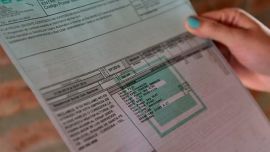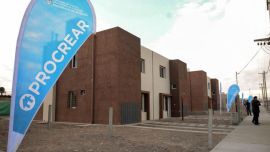A court in Buenos Aires on Wednesday upheld the corruption conviction and sentence against former president Cristina Fernández de Kirchner in the so-called ‘Vialidad’ case, confirming the six-year jail term given to the veteran Peronist leader and her lifetime ban from holding public office.
Fernández de Kirchner, who was Argentina’s president from 2007 to 2015 and vice-president from 2019-2023, can still appeal her conviction for "fraudulent administration" to the Supreme Court.
The 71-year-old will not serve any jail time until the conviction is deemed final when, given her age, she would be eligible for house arrest. She can continue to hold political roles until all avenues of appeal have been exhausted.
Fernández de Kirchner was first sentenced in 2022 for alleged corruption in the awarding of public works projects during her presidency. Those convictions have now been upheld by a higher court, which reviewed the verdicts for the ex-president and 12 other defendants standing trial.
Wednesday’s ruling, in which Fernández de Kirchner and several of her ex-officials were condemned, was streamed live on the Internet from a courthouse in the Buenos Aires neighbourhood of Retiro.
The former president, like many of the defendants, was not in court for the reading of the ruling.
Chamber IV of the Federal Chamber of Criminal Cassation, composed of Judge Gustavo Hornos, Mariano Borinsky and Diego Barroetaveña, ruled that the previous trial had “demonstrated a series of acts of government” that deliberately created a “circuit of irregularities.”
They decided to “sentence Cristina Elisabet Fernández de Kirchner to six years in prison” and “special perpetual disqualification from holding public office,”
The Partido Justicialista leader was held “criminally responsible for the crime of fraudulent administration to the detriment of the public administration.”
Confirming the findings of the federal court, the judges ruled by a two-to-one majority (Hornos in the minority) to uphold the previous ruling and reject prosecution demands for a 12-year prison sentence and an additional conviction of “illicit association.”
The Cassation Court also confirmed six-year prison sentences for former Public Works secretary José López, former head of the National Highway Administration Nelson Periotti, and Kirchnerite tycoon Lázaro Báez.
Acquittals of charges against former Federal Planning Minister Julio De Vido and the acquittals of Abel Fatala and Héctor René Garro were also confirmed, although these are likely to be appealed by prosecutors before the Supreme Court.
Meanwhile, the court confirmed jail terms for several former employees of the National Highway Administration, giving a five-year sentence for Juan Carlos Villafañe, a 54-month term for Raúl Pavesi, four years to José Santibáñez and three years to Raúl Daruich.
‘Witch-hunt’
Fernández de Kirchner was found guilty in December, 2022 of "fraudulent administration" during her terms as president between 2007 and 2015.
The court banned the former president – also a former first lady – from public office after a trial she dismissed as a political witch-hunt.
During the trial, the prosecutor denounced what he called "a system of institutional corruption" and "probably the largest corruption operation" in the country, with "systematic irregularities in 51 calls for tender" over 12 years.
The period investigated includes her eight years in office and the preceding four years when her late husband Néstor Kirchner, who died in 2010, was president.
Most of the alleged corruption focused on her in their political fiefdom of southern Santa Cruz Province.
During the original trial, prosecutors alleged that between 2003 and 2015, 80 percent of national public works projects in Santa Cruz were steered towards Báez's companies.
Fernández de Kirchner is also the target of several other investigations for alleged money-laundering and obstruction of justice. She denies all the charges against her and says she is a victim of a campaign of judicial and political persecution.
A negative ruling had been predicted by the former president, who on Tuesday published a letter entitled ‘Los Copitos de Comodoro Py’ – a reference to the alleged perpetrators of the attempted assassination she survived in September 2022 and the federal courthouse investigating the crimes of which she is accused.
“The ‘Causa Vialidad’ started as a show trial and will end the same way,” the former president wrote in her letter, accusing her enemies of attempting to ban her from politics.
‘Without any doubt’
Fernández de Kirchner has been a staunch opponent of President Javier Milei's policy of deregulation and slashing public spending.
Milei came to power on a tide of disaffection with the Peronist movement, which has dominated Argentine politics for most of the country's post-war history and was has been led by Fernández de Kirchner for the past two decades.
Milei reacted to the ruling by affirming that “without any doubt Cristina Fernández de Kirchner is guilty of acts of corruption.”
"I remember that in the [election] campaign [last year] we were criticised for not taking a position on the guilt of Cristina Fernández de Kirchner. Well, today (during this government) the Argentine justice system confirmed the conviction and life disqualification from holding public office of the former president," said the La Libertad Avanza leader in a social media post.
Prior to the hearing of the court’s ruling, supporters of the former president staged a “public class” on “lawfare” on the streets outside the Comodoro Py federal courthouse in Retiro.
Rows of white chairs were put out to block streets ahead of the class, which social leader Juan Grabois and Buenos Aires Province Justice Minister Juan Martín Mena led.
As the ruling against the former president was read out, on the ground floor of the federal courthouse, in the building’s basement another ongoing trial was continuing. In the dock are the trio accused of carrying out Fernández de Kirchner’s attempted assassination – Fernando Sabag Montiel, Brenga Uliarte and Gabriel Carrizo.
– TIMES/NA/AFP























Comments